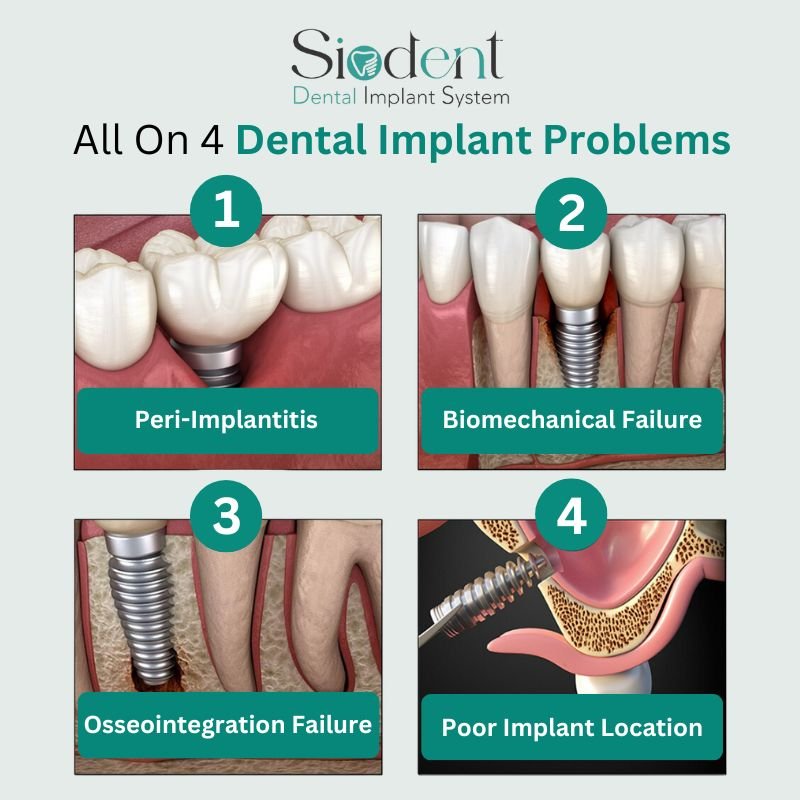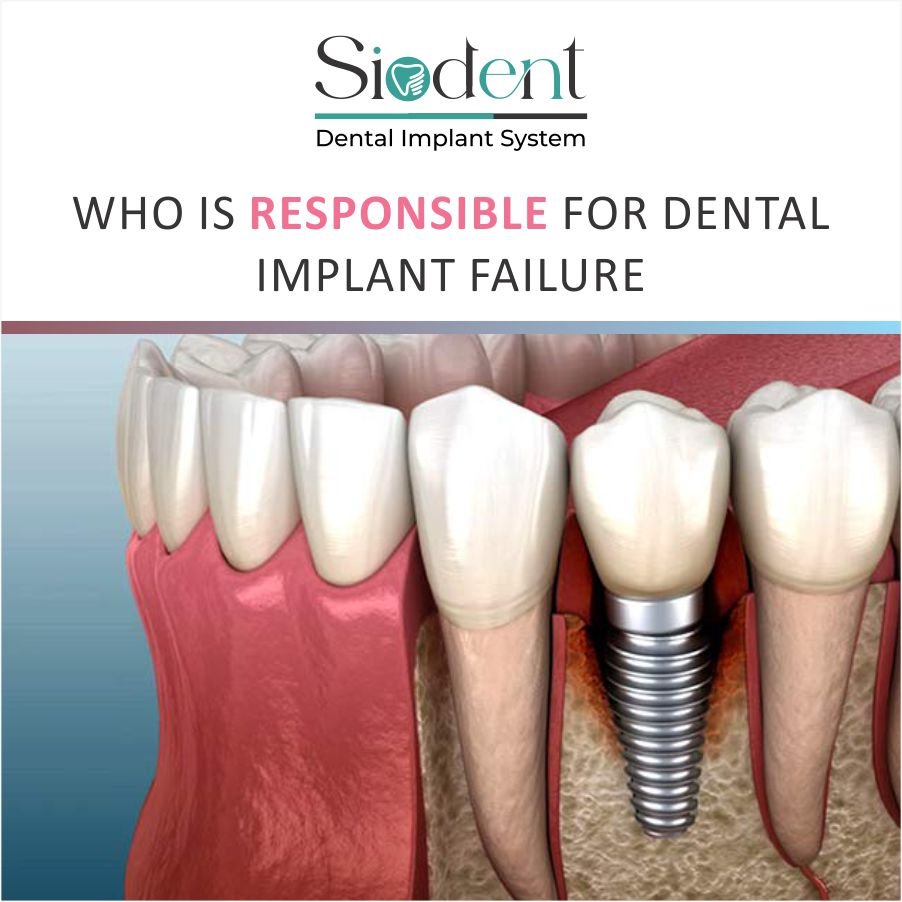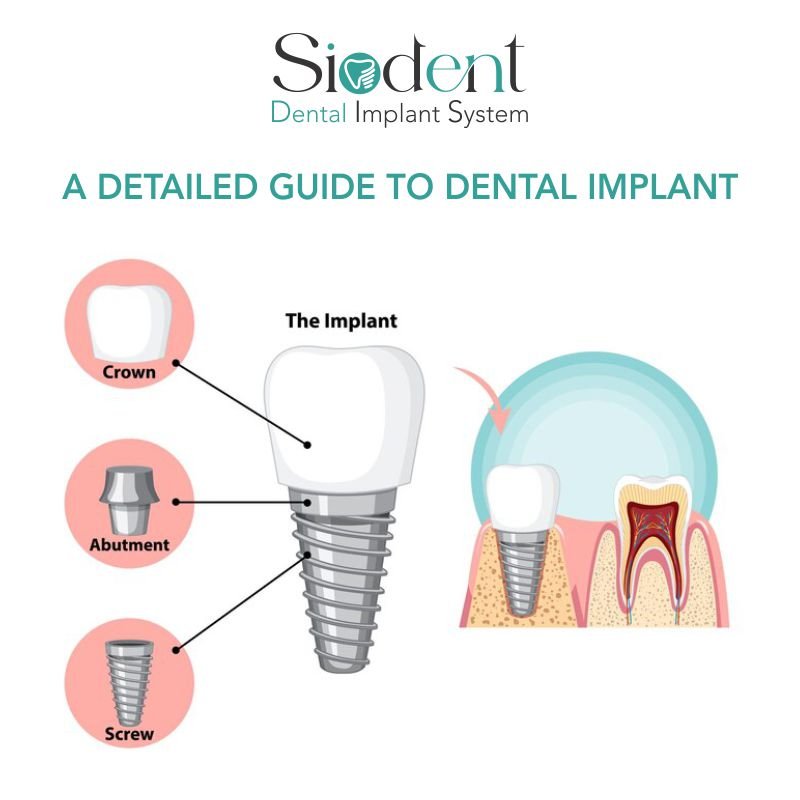The All-on-4 dental implant technique has revolutionized tooth replacement, offering a full-arch restoration solution that provides stability, functionality, and a natural look for patients who have lost multiple teeth. Despite its many advantages, some people experience issues with All-on-4 dental implants. Below, we will explore common All On Four Dental Implants problems and discuss tips for avoiding or addressing them.
Success Rate of All-on-4 Implants
The success rate of All-on-4 implants is generally high, often around 95-98% when performed by skilled professionals. However, while most patients experience lasting benefits, a small percentage may encounter challenges. Variables such as bone density, the patient’s health, and post-procedural care can impact the success of the implants, occasionally leading to complications or Dental Implant Failure.
7 Common All-on-4 Dental Implants Problems
Though All-on-4 implants offer an efficient and effective solution for tooth replacement, certain issues may arise:
- Initial Discomfort and Swelling
As with any surgical procedure, some discomfort and swelling are normal in the days following surgery. However, if pain persists or worsens, it could signal an infection or other underlying issue.
- Bone Loss
Bone loss around the implant area can occur if the implants aren’t correctly placed or if they lack proper support. This can lead to instability over time, potentially causing failure in some cases.
- Nerve Damage
Nerve injury, though rare, is possible if an implant impinges on a nerve. This may result in numbness, tingling, or pain in the lips, chin, or tongue.
- Infection
One of the more common All-on-4 dental implants problems is infection at the implant site. Poor oral hygiene, excessive smoking, or inadequate post-surgery care can all heighten the risk.
- Mechanical Complications
Occasionally, patients experience mechanical issues, such as loose or broken screws, that compromise the integrity of the implants. These problems with All-on-4 dental implants often require professional repair.
- Gum Recession
Gum tissue around the implants may recede, exposing part of the implant, which can result in both aesthetic and functional concerns, as well as an increased risk of infection.
- Implant Failure
Although rare, complete implant failure can occur due to factors such as poor bone quality, excessive force on the implants, or an undiagnosed infection.

What to Do if You’re Experiencing All-on-4 Dental Implants Problems?
If you notice problems with All on 4 dental implants, consult your dental specialist promptly. Early intervention can address many complications, preventing them from escalating. Here are steps you can take:
- Seek Immediate Help
Reach out to your implant specialist as soon as you experience unusual discomfort, swelling, or any visible issues with the implant area. If not, the all-on-4 dental implants problems may become worse.
- Follow Prescribed Treatments
For infections, antibiotics may be prescribed, and for structural concerns, adjustments or repairs to the implants may be necessary.
- Maintain Hygiene
Keeping your implants and mouth clean is crucial to minimizing further issues.
What’s the Best Way to Avoid All on 4 Implants Problems?
Preventive care is one of the best strategies for avoiding all on 4 dental implants problems:
- Choose an Experienced Implant Specialist
A trained professional can ensure precise placement and high-quality materials, both of which contribute to a successful outcome.
- Follow Post-Op Care Instructions
After the surgery, it’s essential to follow your dentist’s instructions regarding diet, hygiene, and lifestyle adjustments. It is one of the best ways to avoid problems with all on 4 dental implants.
- Schedule Regular Checkups
Regular visits help your dentist detect and address potential all on 4 dental implants problems before they worsen.
All-on-4 dental implants can be a life-changing solution for many, providing stability and confidence to those struggling with tooth loss. By understanding potential All on 4 Dental Implants Problems, taking preventive measures, and seeking prompt treatment for any concerns, patients can maximize the longevity and success of their implants.
FAQ’s
What should I do if I experience discomfort with my All-on-4 implants?
If you experience discomfort, contact your dentist immediately. They can assess the issue and recommend adjustments or treatments.
Can All-on-4 implants be repaired or adjusted if needed?
Yes, All-on-4 implants can be repaired or adjusted if necessary. Your dentist can address any issues with the fit, function, or alignment.
How much experience should a surgeon have to perform the All-on-4 procedure?
Ideally, your surgeon should have significant experience in implant dentistry and be trained specifically in All-on-4 procedures to ensure the best results.
Are All-on-4 dental implants comfortable?
Yes, All-on-4 implants are designed to feel and function like natural teeth, providing comfort once fully healed.




